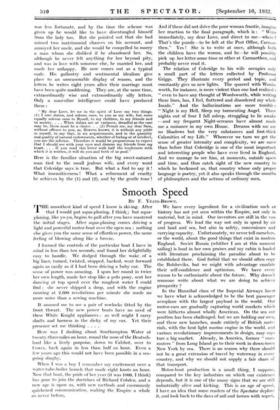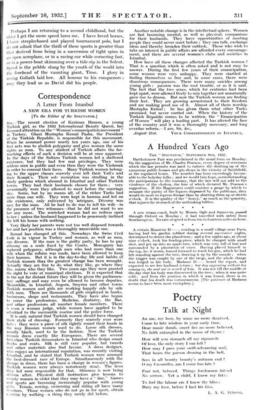Smooth Speed
BY F. YEA
TS-BROWN.
Fr HE smoothest kind of speed I know is ski-ing. After that I would put aqua-planing, I think ; -but aqua- planing, like yo-yo, begins to pall after you have mastered the initial stages. After aqua-planing comes driving a light and powerful motor-boat over the open sea : nothing else gives you the same sense of effortless power, the same feeling -of blowing along like a breeze.
I learned the controls of the particular boat I have in mind in less thati ten seconds, and found her delightfully. easy to handle. We dodged through the . wake, of a big liner, turned, twisted, stopped, backed, went forward again as easily as if I had been driving a.baby car. The sense of power was amazing. I spun her round in twice her own length, made her stop like a polo pony, sent her dancing at top speed over the roughest water I could find : she never shipped a drop, and with the engine running at 2,600 revolutions per minute she made no more noise than a sewing machine.
It amused me to see a pair of rowlocks fitted by the front thwart. The new power boats have no need of these White Knight appliances : as well might I carry shafts and harness in the dicky of my car. Yet their presence set me thinking . . . .
Here was I dashing about Southampton Water at twenty-three miles an hour, round the nose of the Deutsch- land like a lively porpoise, down to Calshot, over to Cowes, back again in less than half an hour. Even a few years ago this would not have been possible in a sea- going dinghy.
When I was a boy I remember my excitement over a water-tube-boiler launch that made eight knots an hour. Now that boat, the pride of her year (it was 1900, I think) has gone to join the doctrines of Richard Cobden, and a new age is upon Us, with new methods and enormously. quickened communication, making the Empire a whole as never before. We have every ingredient for a civilization such as history has not yet seen within the Empire, not only in material, but in mind. Our inventors are still in the van of progress. We lead the way not only in speed by air and land and sea, but also in. safety, convenience and carrying capacity. Unfortunately, we never tell ourselves, or the world, about the good things that exist in modern England. Soviet Russia (whither I am at this moment sailing) is loud in her own praises and my cabin is loaded with literature proclaiming the paradise about to be established there. God forbid that we should often copy the Bolsheviks, but we might with advantage emulate their self-confidence and optimism. We have every reason to be enthusiastic about the future. Why doesn't someone write about what we are doing to achieve prosperity ?
- In the Hannibal class of the Imperial Airways liners we have what is acknowledged to be the best passenger aeroplane with the largest payload in the world: Our motor-ears are gradually capturing world markets which were hitherto almost wholly American. On the sea our position has been challenged, but we are holding our own, and these new launches, made entirely of British mate- rials, with the best light marine- engine in the world, and various revolutionary improvements in design, may cap- ture a big. market. Already, in -America, former "com- muters " from Long Island go to their work in down-town New York by sea. There is no reason why there should not be a great extension of travel. by waterway in every country, and why we should not supply a fair share of that transport.
Motor-boat production is a small thing, I suppose, compared to the key industries on which our existence depends, but it is one of -the many signs. that We are still industrially alive and kicking. This is an age of speed. I have an idea that some readers of the Spectator deplore it, and look back to the days of sail-and horses With regret.
Perhaps I am returning to a second childhood, but the older I get the more speed lures me. I have loved horses. I have • steeplechased and played tournament polo, but I do not admit that the thrill of these sports is greater than that derived from being in a succession of tight spins in an open aeroplane, or in a racing car while cornering fast, or in a power-boat skimming over a tide-rip in the Solent. Speed is the pebble slung by the youth of the world into the forehead of the vaunting giant, Time. I glory in seeing Goliath laid low. All honour to his conquerors : may they 'lead us as David did his people.































 Previous page
Previous page